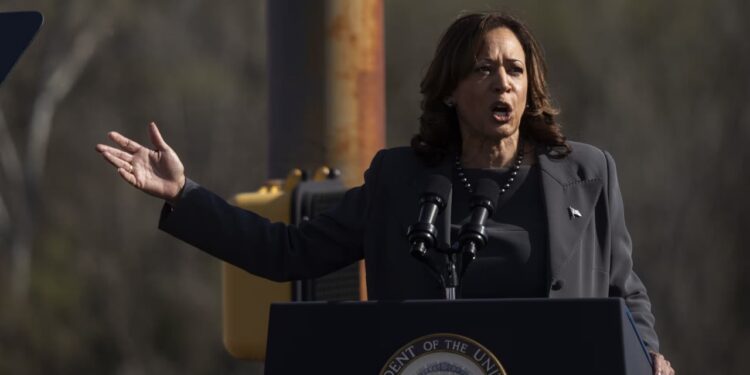The vice-president called for a ceasefire and the immediate release of hostages, in comments that appeared to be the strongest yet by a US leader on Gaza
US vice-president Kamala Harris has bluntly called out Israel for not doing enough to ease a “humanitarian catastrophe” in Gaza as the Biden administration faces increasing pressure to rein in its close ally while it wages war with Hamas militants.
Harris, speaking on Sunday in front of the Edmund Pettus Bridge in Selma, Alabama, where state troopers beat US civil rights marchers nearly six decades ago, called for an immediate ceasefire in Gaza and urged Hamas to accept a deal to release hostages in return for a 6-week cessation of hostilities.
But she directed the bulk of her comments at Israel in what appeared to be the sharpest rebuke yet by a senior leader in the US government over the conditions in the coastal enclave.
“People in Gaza are starving. The conditions are inhumane and our common humanity compels us to act,” Harris said at an event to commemorate the 59th anniversary of Bloody Sunday in Alabama.
“The Israeli government must do more to significantly increase the flow of aid. No excuses,” Harris said.
Her comments reflected intense frustration within the US government about the war, which has hurt president Joe Biden’s standing with left-leaning voters as he seeks re-election this year.
Harris said Israel must open new border crossings, not impose “unnecessary restrictions” on aid delivery, protect humanitarian personnel and convoys from becoming targets, and work to restore basic services and promote order so that “more food, water and fuel can reach those in need.“
The United States carried out its first airdrop of aid into Gaza on Saturday and Harris is scheduled to meet with Israeli war cabinet member Benny Gantz on Monday at the White House, where she is expected to deliver a similarly direct message.
On Sunday, a Hamas delegation had arrived in Cairo for the latest round of ceasefire talks, billed by many as the final possible hurdle for a truce, but it was unclear if any progress was made. Israeli newspaper Yedioth Ahronoth’s online version reported that Israel boycotted the talks after Hamas rejected its demand for a complete list naming hostages who are still alive.
“Hamas claims its wants a ceasefire. Well, there is a deal on the table. And as we have said, Hamas needs to agree to that deal,” Harris said. “Let’s get a ceasefire. Let’s reunite the hostages with their families. And let’s provide immediate relief to the people of Gaza”.
Washington has insisted the ceasefire deal is close and has been pushing to put in place a truce by the start of Ramadan, a week away. A US official on Saturday said Israel has agreed on a framework deal.
An agreement would bring the first extended truce of the war, which has raged for five months so far with just a week-long pause in November. Dozens of hostages held by Hamas militants would be freed in return for hundreds of Palestinian detainees.
After the Hamas delegation arrived, a Palestinian official told the Reuters news agency the deal was “not yet there”. There was no official comment from Israel.
Qatari and US mediators also arrived in the Egyptian capital on Sunday, according to the state-linked Al Qahera News.
Ceasefire talks come after the death last week of more than 100 Palestinians approaching an aid truck in Gaza, an incident Harris recalled during her speech.
“We saw hungry, desperate people approach aid trucks simply trying to secure food their family after weeks of barely no aid reaching northern Gaza and they were met with gunfire and chaos,” Harris said.
Israel said on Sunday its initial review of the incident had found that most of those killed or wounded had died in a crowd crush.
Military spokesperson Daniel Hagari said Israeli troops at the scene initially fired only warning shots, though they later shot at some “looters” who “approached our forces and posed an immediate threat”.
Muatasem Salah, a member of the emergency committee at the ministry of health in Gaza, told Reuters the Israeli account was contradicted by machine gun wounds.
In her comments, Harris laid out specific ways in which the Israeli government could allow more aid into Gaza.
“They must open new border crossings. They must not impose any unnecessary restrictions on the delivery of aid. They must ensure humanitarian personnel, sites and convoys are not targeted, and they must work to restore basic services and promote order in Gaza, so more food, water and fuel can reach those in need.”

